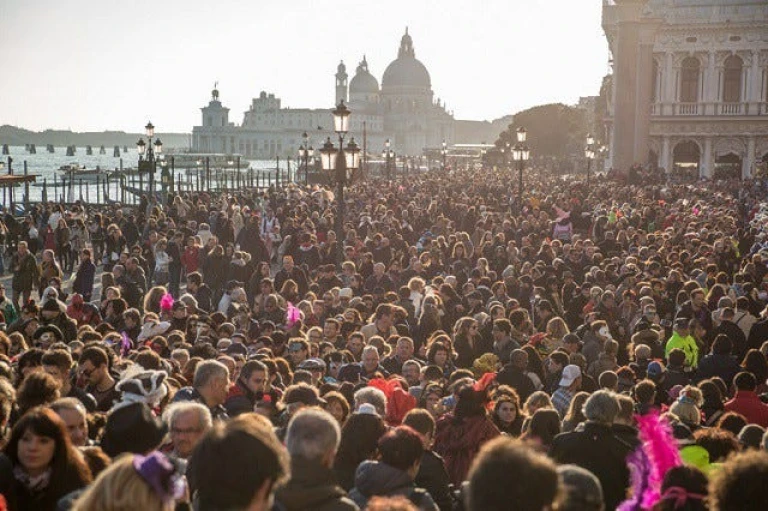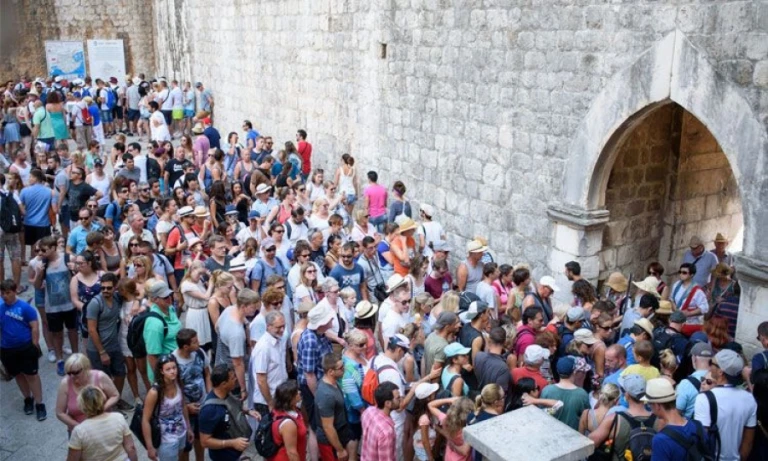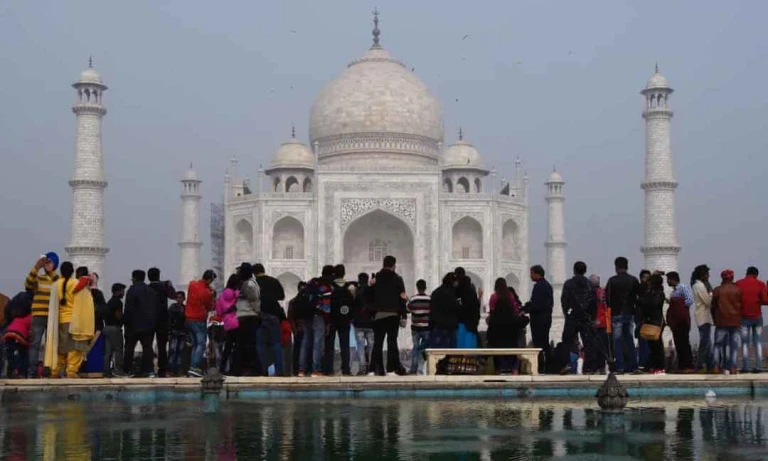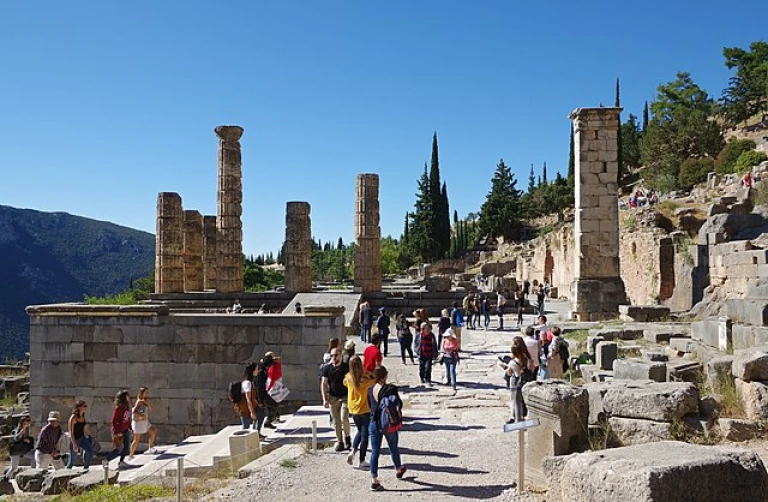A spotlight on Over-tourism: Explained
Over-tourism stands as a formidable challenge in the global tourism landscape, compelling nations across the world to confront its multifaceted impacts.
From the serene landscapes of Japan to the historic cities of Croatia and the diverse cultural tapestry of India, each destination grapples with over-tourism in its unique way.
Let's delve into the initiatives, challenges, and solutions shaping the response to over-tourism in Japan, Croatia, and India.
Understanding Over-tourism
 Over-tourism, characterized by an unsustainable influx of visitors, poses significant threats to the environmental, social, and economic fabric of destinations.
Over-tourism, characterized by an unsustainable influx of visitors, poses significant threats to the environmental, social, and economic fabric of destinations.
The strains of overcrowding, environmental degradation, and cultural erosion reverberate through crowded streets and overburdened landmarks, highlighting the urgent need for intervention.
The Main Problem with Over-tourism
 At the heart of the issue lies the strain imposed on destinations and their communities. Environmental degradation, exacerbated by overuse and exploitation, threatens delicate ecosystems and cultural heritage sites.
At the heart of the issue lies the strain imposed on destinations and their communities. Environmental degradation, exacerbated by overuse and exploitation, threatens delicate ecosystems and cultural heritage sites.
Socially, residents face escalating costs of living and a loss of cultural identity, while economic benefits often fail to reach local communities, widening socioeconomic disparities.
Steps Being Taken
Japan: Managing Mount Fuji and Beyond
 Japan has implemented measures such as entry fees and daily visitor caps at popular sites like Mount Fuji to alleviate congestion and preserve natural resources.
Japan has implemented measures such as entry fees and daily visitor caps at popular sites like Mount Fuji to alleviate congestion and preserve natural resources.
Additionally, cities like Hiroshima and Osaka are leveraging technology, such as online ticketing systems and smart waste management, to manage tourist flows more efficiently.
However, challenges persist in striking a balance between tourism development and cultural preservation.
Also read: What Souvenirs to buy in Japan? A complete list
Croatia: Preserving Heritage Amidst Crowds
 Croatia, notably Dubrovnik, faces the challenge of preserving its cultural heritage while managing over-tourism.
Croatia, notably Dubrovnik, faces the challenge of preserving its cultural heritage while managing over-tourism.
Initiatives like banning new rental permits and restricting cruise ship arrivals aim to safeguard the city's historic character.
Nevertheless, debates among residents and businesses underscore the need for sustainable solutions to ensure the long-term viability of Croatia's cultural heritage.
Also read: 15 things you must know before visiting Croatia from India
India: Diverse Landscapes, Shared Challenges
 In India, over-tourism manifests across diverse landscapes, from overcrowded heritage sites to degraded natural habitats.
In India, over-tourism manifests across diverse landscapes, from overcrowded heritage sites to degraded natural habitats.
Efforts to address these challenges include the introduction of entry fees at iconic landmarks such as the Taj Mahal and initiatives to promote sustainable tourism in ecologically sensitive areas.
However, managing over-tourism requires striking a delicate balance between conservation efforts and economic growth, particularly in regions heavily reliant on tourism revenue.
Are there any solutions?
In the face of over tourism's complexities, viable solutions emerge, offering pathways to mitigate its adverse impacts.
Through collaborative efforts and strategic interventions, destinations worldwide can navigate the challenges posed by excessive tourism.
Promoting Off-Season Travel and Limiting Visitor Numbers
 One key strategy to manage over-tourism is the promotion of off-season travel. By encouraging visitors to explore destinations during quieter periods, the burden on infrastructure and resources can be alleviated.
One key strategy to manage over-tourism is the promotion of off-season travel. By encouraging visitors to explore destinations during quieter periods, the burden on infrastructure and resources can be alleviated.
Additionally, limiting visitor numbers where possible helps prevent overcrowding and reduces the strain on sensitive ecosystems and cultural sites.
Implementing Greater Regulation and Sustainable Practices
 Stricter regulations within the tourism industry play a crucial role in addressing over-tourism. Governments can enforce measures such as zoning restrictions, capacity limits, and environmental protection laws to ensure sustainable tourism practices.
Stricter regulations within the tourism industry play a crucial role in addressing over-tourism. Governments can enforce measures such as zoning restrictions, capacity limits, and environmental protection laws to ensure sustainable tourism practices.
Encouraging businesses to adopt sustainable practices, such as reducing waste and minimizing carbon emissions, further contributes to the preservation of destinations.
Fostering Community Involvement and Reducing Friction
 Community involvement is paramount in the fight against over-tourism. Engaging residents as stakeholders empowers them to actively participate in decision-making processes and shape the future of tourism in their communities.
Community involvement is paramount in the fight against over-tourism. Engaging residents as stakeholders empowers them to actively participate in decision-making processes and shape the future of tourism in their communities.
By addressing concerns and finding solutions to reduce friction between residents and tourists, destinations can foster a harmonious relationship that benefits both parties.
Promoting Alternative Destinations and Sustainable Travel
 Redirecting travelers to alternative, less-visited destinations offers relief to over-tourist areas while spreading the economic benefits of tourism more evenly.
Redirecting travelers to alternative, less-visited destinations offers relief to over-tourist areas while spreading the economic benefits of tourism more evenly.
Promoting sustainable travel practices, such as supporting local businesses and respecting cultural and environmental sensitivities, encourages responsible tourism behavior.
This not only reduces the negative impacts of over-tourism but also fosters a deeper, more meaningful travel experience for visitors.
Also read: How to become an Eco tourist? Complete Guide
 As destinations navigate the crescendo of over-tourism, collaboration emerges as the cornerstone of sustainable tourism.
As destinations navigate the crescendo of over-tourism, collaboration emerges as the cornerstone of sustainable tourism.
Governments, businesses, communities, and travelers must harmonize efforts to strike a balance between tourism development and preservation.
By embracing collective responsibility and prioritizing sustainability, nations can chart a course towards a more resilient and inclusive tourism future.
Together, we can orchestrate a symphony of tourism that enriches lives, preserves cultural heritage, and protects the planet for generations to come.
Published at
About Author
Prerna Dixit
Subscribe our Newsletter
Get our weekly tips and travel news!
Related Posts
5 Indian Tourist Spots That Look Better in Photos Than Real Life in 2026
In 2026, many Indian tourist spots look like paradise online but feel crowded in person. Here is the truth behind the filters.
How Climate Change Is Reshaping Travel Planning
Climate change is rewriting the rules of travel. Discover why the “best time to visit” no longer applies and how travelers are adapting.
Is Traveling in Planes Unsafe in 2025? What does statistics say
Aviation fears in 2025 are rising, but is flying truly less safe?
How to be a Responsible Traveler This World Environment Day 2025
Practical tips for sustainable choices in accommodation, transport, and local engagement, minimizing your impact and preserving our planet for future generations.
World Environment Day 2025: Why Sustainable Tourism Matters More Than Ever
Sustainable tourism is crucial!
Latest Posts
India Cuts Foreign Travel Tax to 2%: Bali, Oman, Thailand Just Got More Affordable
Planning that dream vacation to Bali or Oman? Here's great news from Budget 2026—the government just slashed the tax on foreign tour packages from a painful 20% to just 2%. Your overseas holiday just became a lot easier on the wallet.
5 Expensive Tourist Activities in India That Are Actually Not Worth It in 2026.
From yachts to helicopter rides, these 5 expensive tourist activities in India disappoint more than they deliver in 2026.
7 Secret Beaches in India Nobody Knows About Yet in 2026
Skip the crowds and discover 7 hidden beaches in India still untouched in 2026.
5 Indian Tourist Spots That Look Better in Photos Than Real Life in 2026
In 2026, many Indian tourist spots look like paradise online but feel crowded in person. Here is the truth behind the filters.
7 Truth About Traveling India Nobody Tells You Before You Go in 2026
Discover India in 2026! From phone payments to fast trains, here are 7 simple tips for a smooth and amazing journey.

